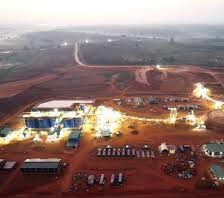The National Committee of the Extractive Industries Transparency Initiative (Comité national de l’Initiative pour la Transparence dans les Industries Extractives – CN-ITIE) of the Republic of Mauritania has just published its national EITI 2022 report. To mark the occasion, Minesactu.info spoke to Abdoullah Diop, Permanent Secretary of EITI Mauritania. He gave a brief overview of Mauritania’s mining sector, presenting the nature of the minerals mined and key data on the country’s mining sector. He discusses the major reforms introduced by the CN-ITIE, including the DataWarehouse, which enables reports to be published in record time.
Mines Actu Burkina: Could you briefly describe the mining sector in Mauritania?
Abdoullah Diop: With over 13 million tonnes exported by 2021, Mauritania is one of Africa’s biggest exporters of iron ore. Its two other main mining resources are gold and copper. The country also produces cement, gypsum, quartz and salt, and could soon be producing uranium.
In 2022, the extractive sector provided around 30% of government budget revenues, generating 25,762 billion MRU (around 412 billion FCFA), an increase of 17% on the previous year. The sector, mainly mining, employs less than 1% of the working population, with 9,165 direct jobs.
When did Mauritania join the EITI?
Mauritania joined the EITI in 2007.
How many reports have been published since then?
Since its accession, Mauritania has published 17 reports covering 18 financial years (from 2005 to 2022). The 2020 and 2021 financial years were covered by a single report.
What is the composition of the Multiparty Group (Groupe multipartite – GMP)?
The GMP Mauritania has 31 members divided into 3 colleges: government college; civil society college; and business college. The civil society college is in the majority, with 14 members, i.e. 35% of the membership.
The GMP is chaired by an advisor to the Prime Minister, Mohamed Lemine Ahmedou. The GMP is supported by a national Technical Secretariat.
How many validations has Mauritania undergone and what are the scores?
Mauritania was last validated in 2020. The country achieved a good score of “significant progress”. The next validation will take place in January 2024.
What are Mauritania’s major innovations in implementing the EITI standard?
The first innovation is “DataWarehouse”, a data platform developed by Mauritania and its partner GIZ. This platform enables the systematic collection and publication of data from the extractive sector, which is accessible to everyone and easy to use. The implementation of this Data Warehouse has made it possible to produce the 2019, 2020-2021 and 2022 reports in record time, with up-to-date and exhaustive data, while reducing their cost.
The second innovation is the “Pilot Report”. For the 2020-2021 and 2022 reports, Mauritania has opted for the pilot approach proposed by the international EITI secretariat. This method goes beyond the simple reconciliation of payments, with a focus on analysing the integrity of payments, the collection and management systems of state entities and a reconciliation based on risk flows. This adds significant value to the reports.
These two innovations earned Mauritania the EITI Champion award from the EITI Chair in June 2023.
What reforms do you think the implementation of the EITI has brought to the mining sector in general?
The implementation of the EITI, over and above the reforms, has made it possible to awaken civil society and the population in general to the challenges of the extractive sector, its contribution and its prospects. Secondly, in concrete terms, the GMP succeeded in getting at least two decrees passed on beneficial ownership and systematic disclosure. The recommendations contained in the EITI reports are also the subject of an interministerial meeting each time a report is published. This enables responses to be made to the weaknesses identified.
What are the next challenges to be revealed by the CN-ITIE?
In terms of challenges, there is a need to consolidate what has been achieved in terms of systematic disclosure and pilot reporting. Progress must be made in implementing requirement 2.5. The CN-ITIE will be working to incorporate the requirements of the new 2023 standard, with all its new features, and to broaden the public debate on the extractive sector, with a view to improving governance in the mining sector.
Interview conducted by Elie KABORE from Nouadhibou (Mauritania)






